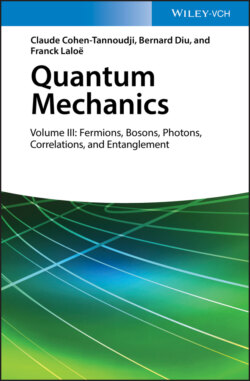Читать книгу Quantum Mechanics, Volume 3 - Claude Cohen-Tannoudji - Страница 65
β. Physical discussion: occupation number fluctuations
ОглавлениеFor two different physical states i and j, the average value for an ideal gas is simply equal to the product of the average values and ; this is a consequence of the total absence of interaction between the particles. The same is true for the average value .
Now if i = j, we note the factor 2 in relation (41). As we now show, this factor leads to the presence of strong fluctuations associated with the operator , the particle number in the state . The calculations shows that:
(42a)
The square of the root mean square deviation Δni, is therefore given by:
(42b)
The fluctuations of this operator are therefore larger than its average value, which implies that the population of each state |ui〉 is necessarily poorly defined1 at thermal equilibrium. This is particularly true for large : in an ideal boson gas, a largely populated individual state is associated with a very large population fluctuation. This is due to the shape of the Bose-Einstein distribution (24), a decreasing exponential which is maximum at the origin: the most probable occupation number is always ni = 0. Hence it is impossible to get a very large average without introducing a distribution spreading over many ni values. Complement HXV (§ 4-a) discusses certain consequences of these fluctuations for an ideal gas. It also shows that as soon as a weak repulsive particle interaction is introduced, the fluctuations greatly diminish and almost completely disappear, since their presence would lead to a very large increase in the potential energy.
